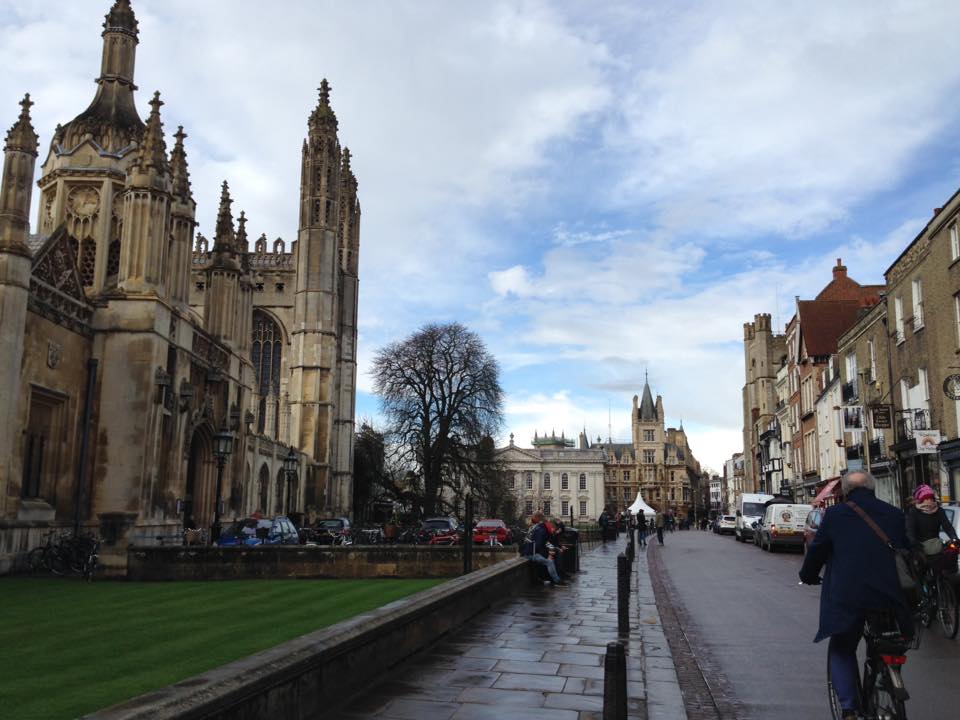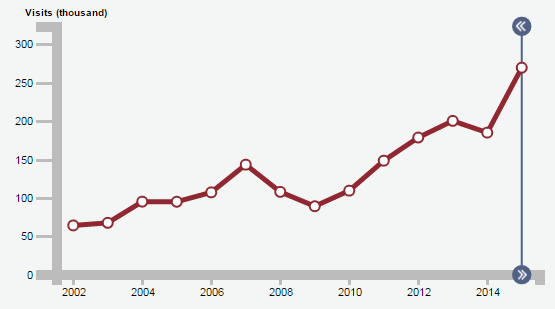I went to Cambridge on a moody day in the middle of March 2017. The sky was cloudy and rain was in the forecast. I boarded a couch with my two gale friends and apparently we were the only U30 folks, amidst respectable grey-haired grandpas and grandmas. Although it was only a day excursion, I wasn’t feeling up to it since the tickets were booked before I saw myself up to my neck with uni work. Well, we boarded the ‘old’ bus and I made myself excited about what laid ahead.

‘Why Cambridge?’ you may ask and already have the answer. My earliest image about England was its old prestigious universities where the bachelors strolled in their gowns and hoods, holding piles of musty books, ruminating in studious library where the only sound was the crispy page turning. And yes, it was in this ambience where the light was dim, sunshines flow through the window glass upon which formulas were rashily scribbled, ingenious ideas came to enlight the knowledge of mankind. I would picture myself submerged in that sphere of knowledge, squinting in awe. A little taste of that would satisfy my ‘great expectation’.
The first thing that struck me upon arrival was that we were not the only excursioners that day. Flocks of Chinese tourists filled the streets. Literally, I mean. Yes, their postures and photo-taking obstruct cars and pedestrians. It must be like this everyday, since that day was mid-week – not an expected peak time. I felt a sheer empathy for the locals, who must have been bored to death with the sight of foreigners ‘taking visual ownership’ of their city. I would be deeply bothered if I were them. Since Chinese tourists stuck in groups, their presence became overwhelming and distressing, for locals and other visitors alike. The university village was supposed to be innocent and pure from the boisterous crowd. Its prestige rightfully laid in the unstirring serenity which was supposed to be reserved and respected, if you asked me. ‘Why can they just split up and roam the village in a civilized way? Why put on these photo show every bloody five minutes on every bloody street corner they turn?’ I grumbled to myself then. ‘You folks have comprehensively ruined my day.’
And what follows in the law of demand and supply? You must have seen this coming. The over-marketing of punting tours on river Cam focusing on Chinese holiday-makers. The stereotypes and assumptions about Chinese visiting behaviour were so formidable that my friends and I were constantly targeted since we traveled in groups and I looked Chinese-like. To an extent, this is understandable in view of the aforementioned over-representation of Chinese tourists. However, being approached and mistaken as a result definitely marred my experience, and I bet other Asian or group travelers would be deeply irritated. If the essence of Cambridge is serenity, ease and nostalgia, where one can expect a little privacy, a moment of silence, a getting-lost stroll along hidden closes, this intrusive commercial and advertising activity is sadly counterproductive.
Well, after doing a bit of research, it turned out I wasn’t the only troubled one. And while the tourists can whine it off and leave it all behind after departure, the community has a much more enduring experience. In fact, frustrated residents were complaining of traffic problems and overcrowded pavements, as over 140,000 people visit Cambridge city center on a Saturday, July 16 last year (Kitching, 2016). It has been claimed that a tourist disaster is awaiting in the near future if measures are not put in place to manage increasing visitor numbers.
Renowed for its historic sites, understandably Cambridge has long been adored by international tourists and increasingly, by the Chinese. The emerging Chinese middle class has been making their Grand tour around Europe, checking off their list established spots like Eiffel Tower, the Louvre and Venice’s Grand Canal. While other European destinations have adapted to accommodate the needs and interests of Chinese to capture their spending power, the UK is no perception. In fact, Chinese vistors to the UK has increased by 50 per cent in the last year, revealed by research done by Visit Britain (Hall, 2011) and there doesn’t seem to be a cease to this wave.

Thus, sympathy could be spared to councillor John Hipkin of Cambridge when he expressed his concern: “This is only the beginning as to what we can expect. The Chinese have decided Cambridge is an essential part of their Europe experience” (Snead, 2016).
Surprisingly, for these Chinese tourists, it was not “the city’s grand 15th-century chapel, meticulously manicured lawns or historical statues” (Cox, 2016) that first drove them to Cambridge, but rather a white granite stone on which poetry lines of Xu Zhimo – the famous poet were carved. After all, the ultimate goal is to pay homage to the well-known poet. In addition to this, other key motivators include ‘enjoy the beauty of the landscape’, ‘feel connected to nature’ and ‘have fun and laughter’, according to Visit Britain’s last year market survey.

While Cambridge is bound to receive enormous tourism receipts from the Chinese’s spending, its capacity and original attractivity may not be sustained. The situation mirrors what has happened in Barcelona, Venice and other destinations worldwide under the impacts of mass tourism. Architectural degradation, pollution, culture commodification…, to name a few, are the catastrophies afoot if the number of tourists are not capped. In light of this, fed-up locals are urging Cambridge’s DMO (Destination Management Organization) to come up with measures to control the inflow of tourists. When asked by Cambridge News, The CEO, Emma Thornton put the problem down to intensive day tourism which triggers an immense concentration of people at one space at specific peak hours. She said the DMO was taking steps to make visitors spend longer time, driving them to other interests or aspects of the city to consequently divert visitor flows to the rural area of Cambridge.
How to change tourist perception of Cambridge as a day trip destination, Mrs. Thornton did not specify, and to be honest, I haven’t figured out for myself. The village is small and the colleges comprise of its main attractions. Without historical and architectural heritage, rural areas in Cambridge may have to design its non-physical heritage such as cultural activities, food festivals or folklore storytelling. However, this has to be done with great prudence since tampering with culture legacies can easily turn into commodifying them. Another quick fix can be to cap the number of day-trippers but the city could risk losing out on tourism revenues and the policy may give Cambridge a bad reputation in visitors’ eyes.
Well well, there seems a lot of challenges ahead but I hope in the end Cambridge can preserve its charmful essence that brings enthusiasts there in the first place.
Reference
BBC News (2013) Cambridge: Chinese tourists pay homage to poet. Available from http://www.bbc.co.uk/news/uk-24895442 [accessed 01 April 2017].
BBC News (2013) Chinese visitors seek out poet’s farewell to Cambridge. Available from http://www.bbc.co.uk/news/uk-england-cambridgeshire-24902748 [accessed 01 April 2017].
Cox, D. (2016) Poetry or property punts: what’s driving China’s love affair with Cambridge? The Guardian, 22 March. Available from https://www.theguardian.com/cities/2016/mar/22/china-cambridge-university-poet-xu-zhimo-farewell-property [accessed 01 April 2017].
Hall, J. (2011) Chinese tourist boom swells visitor numbers to UK. The Telegraph, 15 September. Available from http://www.telegraph.co.uk/news/8765760/Chinese-tourist-boom-swells-visitor-numbers-to-UK.html [accessed 01 April 2017].
Kitching, C. (2016) Cambridge is ‘heading for a tourist disaster’: Locals fed up with traffic jams and clogged pavements complain there are too many holidaymakers. Mail Online, 26 July. Available from http://www.dailymail.co.uk/travel/travel_news/article-3709105/Cambridge-heading-tourist-disaster-says-local-councillor.html [accessed 01 April 2017].
Snead, F. (2016) Fears Cambridge could be heading for ‘tourist disaster’ as thousands flock to city centre. Cambridge News, 16 December. Available from http://www.cambridge-news.co.uk/news/cambridge-news/fears-cambridge-could-heading-tourist-12044889 [accessed 01 April 2017].
The Economist (2010) The Chinese are coming. Available from http://www.economist.com/blogs/bagehot/2010/12/chinese_tourism_britain [accessed 01 April 2017].
Visit Britain (2015) China. Available from https://www.visitbritain.org/markets/china [accessed 01 April 2017].